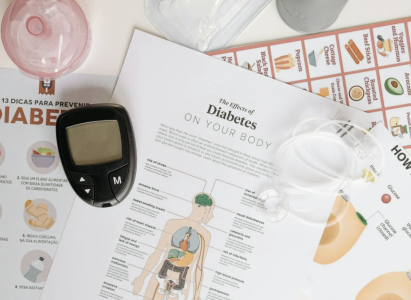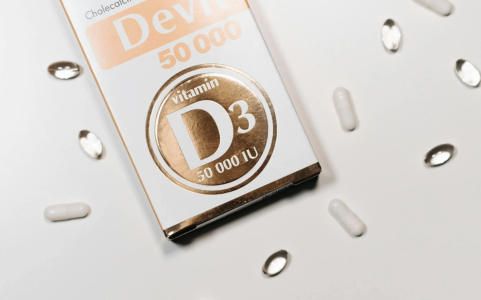Could this vitamin play a role in lowering blood sugar?
By
Veronica E.
- Replies 0
Disclaimer: The information provided in this article is for educational purposes only and is not intended as a substitute for professional medical advice, diagnosis, or treatment. Always consult your physician or other qualified healthcare providers with any questions you may have regarding a medical condition or before making any changes to your health regimen.
For the millions of Americans living with prediabetes, keeping blood sugar in check is a daily priority.
While lifestyle changes like diet and exercise remain the gold standard, new research suggests there may be another helpful tool—vitamin D.
Long known for supporting strong bones, this “sunshine vitamin” is now being studied for its role in blood sugar control and diabetes prevention.
Several recent studies point to a modest but meaningful benefit for people at risk of type 2 diabetes.
Experts say it’s not a replacement for healthy habits, but it may be a valuable part of a broader prevention plan.

What the research shows
Prediabetes affects more than one in three US adults, with blood sugar levels that are elevated but not yet in the diabetic range.
A recent analysis in the Journal of the Endocrine Society reviewed 10 clinical trials involving nearly 4,500 people with prediabetes.
It found that about 18.5% of participants taking vitamin D supplements returned to normal blood sugar levels, compared to 14% in the placebo group.
A 2023 review in the Annals of Internal Medicine also reported that supplementing with vitamin D slightly lowered the risk of developing type 2 diabetes over three years.
Also read: Are you still taking vitamin D this summer? Here’s what experts say
How vitamin D may help
Vitamin D functions in the body much like a hormone, influencing several processes:
Experts caution, however, that vitamin D is not a cure-all.
“It’s very easy to find studies that show associations,” noted Dr. David Cutler, a family medicine physician, who added that many studies showing no link are less likely to be published.
Also read: Could this common vitamin help slow aging? Here’s what the research says
Should you take vitamin D?
There’s no official recommendation to use vitamin D solely for managing blood sugar, but many clinicians suggest testing your levels—particularly if you have risk factors for diabetes, get limited sun exposure, or are over 60.
If you’re deficient, your doctor may suggest supplementation.
In research studies, doses around 4,000 IU daily were common, though individual needs can vary.
Also read: Dietitians reveal: Boost your vitamin D instantly with these 9 surprising superfoods!
Don’t overdo it
High doses of vitamin D can be harmful, leading to excess calcium absorption, kidney stones, constipation, and in rare cases, serious heart or kidney problems.
Always follow medical guidance and avoid self-prescribing high doses.
Also read: Are you taking vitamin D at the wrong time? Experts reveal the secret to maximum absorption
Lifestyle remains key
Even if vitamin D plays a role in blood sugar control, prevention of type 2 diabetes still relies on proven strategies:

Vitamin D may offer added benefits for people with prediabetes, but it should be part of a broader, holistic approach.
Talk with your healthcare provider about whether testing and supplementation are right for you, and continue focusing on the lifestyle habits that have the strongest evidence for preventing type 2 diabetes.
Read next: Pharmacists reveal: The vitamins and minerals you should never pair with your morning coffee

What do you think—would you consider adding vitamin D to your daily routine if it could help protect against type 2 diabetes? Let us know in the comments below!
For the millions of Americans living with prediabetes, keeping blood sugar in check is a daily priority.
While lifestyle changes like diet and exercise remain the gold standard, new research suggests there may be another helpful tool—vitamin D.
Long known for supporting strong bones, this “sunshine vitamin” is now being studied for its role in blood sugar control and diabetes prevention.
Several recent studies point to a modest but meaningful benefit for people at risk of type 2 diabetes.
Experts say it’s not a replacement for healthy habits, but it may be a valuable part of a broader prevention plan.

Researchers are exploring whether vitamin D could help improve blood sugar control and support overall metabolic health. Image Source: Pexels / Pavel Danilyuk.
What the research shows
Prediabetes affects more than one in three US adults, with blood sugar levels that are elevated but not yet in the diabetic range.
A recent analysis in the Journal of the Endocrine Society reviewed 10 clinical trials involving nearly 4,500 people with prediabetes.
It found that about 18.5% of participants taking vitamin D supplements returned to normal blood sugar levels, compared to 14% in the placebo group.
A 2023 review in the Annals of Internal Medicine also reported that supplementing with vitamin D slightly lowered the risk of developing type 2 diabetes over three years.
Also read: Are you still taking vitamin D this summer? Here’s what experts say
How vitamin D may help
Vitamin D functions in the body much like a hormone, influencing several processes:
- Regulating blood sugar–related hormones
- Improving insulin sensitivity, making it easier for cells to use glucose for energy
- Supporting pancreatic function to help insulin production
- Reducing inflammation, which is linked to diabetes risk
Experts caution, however, that vitamin D is not a cure-all.
“It’s very easy to find studies that show associations,” noted Dr. David Cutler, a family medicine physician, who added that many studies showing no link are less likely to be published.
Also read: Could this common vitamin help slow aging? Here’s what the research says
Should you take vitamin D?
There’s no official recommendation to use vitamin D solely for managing blood sugar, but many clinicians suggest testing your levels—particularly if you have risk factors for diabetes, get limited sun exposure, or are over 60.
If you’re deficient, your doctor may suggest supplementation.
In research studies, doses around 4,000 IU daily were common, though individual needs can vary.
Also read: Dietitians reveal: Boost your vitamin D instantly with these 9 surprising superfoods!
Don’t overdo it
High doses of vitamin D can be harmful, leading to excess calcium absorption, kidney stones, constipation, and in rare cases, serious heart or kidney problems.
Always follow medical guidance and avoid self-prescribing high doses.
Also read: Are you taking vitamin D at the wrong time? Experts reveal the secret to maximum absorption
Lifestyle remains key
Even if vitamin D plays a role in blood sugar control, prevention of type 2 diabetes still relies on proven strategies:
- Eat a balanced, low-glycemic diet with plenty of whole foods
- Get regular exercise, aiming for at least 150 minutes a week
- Maintain a healthy weight to improve insulin sensitivity
- Manage stress through relaxation techniques and supportive relationships
- Prioritize sleep, aiming for at least seven hours nightly

Boosting vitamin D levels through safe sun exposure, diet, or supplements may support overall health. Image Source: Pexels / Pavel Danilyuk.
Vitamin D may offer added benefits for people with prediabetes, but it should be part of a broader, holistic approach.
Talk with your healthcare provider about whether testing and supplementation are right for you, and continue focusing on the lifestyle habits that have the strongest evidence for preventing type 2 diabetes.
Read next: Pharmacists reveal: The vitamins and minerals you should never pair with your morning coffee
Key Takeaways
- New research suggests vitamin D supplementation may help people with prediabetes lower blood sugar and reduce diabetes risk, though the effect is modest.
- Vitamin D supports blood sugar metabolism and reduces inflammation, but it is not a substitute for proven prevention strategies.
- No official recommendation exists to use vitamin D solely for blood sugar control; supplementation should only be started under medical advice, as high doses can be harmful.
- Preventing type 2 diabetes still relies on healthy eating, regular exercise, weight management, sleep, stress reduction, and personalized guidance from a healthcare provider.
What do you think—would you consider adding vitamin D to your daily routine if it could help protect against type 2 diabetes? Let us know in the comments below!






